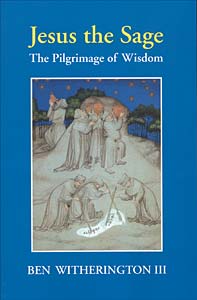My goal is that they may be encouraged in heart and united in love, so that they may have the full riches of complete understanding, in order that they may know the mystery of God, namely, Christ, in whom are hidden all the treasures of wisdom and knowledge (Colossians 2:2-3, NIV).
A number of years ago, C. S. Lewis framed the Liar, Lunatic, Lord argument that asserted that Jesus could not possibly have been merely a good teacher-either he lied about his own identity which would make him not good, he was deluded about his own identity (also not good) or he was truthful in his claim to be the Lord of all. An unintended consequence of that argument is that we may deprecate Jesus standing as a teacher in our efforts to assert his Lordship.

In Jesus the Sage: The Pilgrimage Of Wisdom Ben Witherington III brings Jesus as Teacher and Jesus as Lord together in his exploration of Wisdom writings and how these influenced Jesus himself, and how they influenced the view of Christ, or Christology of the earliest Christians and the New Testament writers.
The first part of this book traces the trajectory from Solomon and the earliest Wisdom literature up through Ecclesiastes and extra-canonical books like The Wisdom of Solomon and Ben Sira. In this we see a development from Wisdom as Lady Sophia, with God at the Creation, to Wisdom as the Spirit of God. Witherington also argues in this section that these Jewish wisdom sources, and not Greek Cynics influenced Jesus and the early church. He draws the parallels between wisdom sayings in these works and the teaching of Jesus, particularly his use of parable and aphorism.
The second part of the book looks at the movement from Jesus to the early church and how these wisdom traditions influenced Q and James, the earliest hymns of the church, the writing of Paul, and the Gospels of Matthew and John. The basic trajectory is to see Jesus as not only incarnate God but as incarnate Wisdom, the one “greater than Solomon” (Matthew 12:42). One of the great services Witherington does is to show not only the linkage of the wisdom traditions to the early hymns of the church such as Philippians 2:5-11 (which very likely preceded Paul’s writing by some time) but to show that these indicate that the church’s view of Christ, or Christology, was a high one from the beginning-not a late development. I also found his treatment of both Matthew and John as Wisdom books illuminating because, while they do not depend on each other, they both portray Jesus as the wise teacher or logos, they emphasize discourse, and discipleship, among other parallels.
This is but a cursory survey of a rigorously scholarly work that makes an important contribution in reconciling the ideas of Jesus as Lord and Teacher, the one who is Wisdom in human flesh, not the builder of the temple as was wise Solomon, both “God with us”, the living temple. Years ago, Dallas Willard challenged a number of us with the Colossians verse at the beginning of this review and the implications of this truth for every academic discipline in the university.
- Do we truly believe Jesus knows physics, or law, or business, or history?
- Do we believe that his wisdom can illuminate our understanding as we wrestle with the deepest questions the academy can pose?
What Witherington has done is lay out the biblical (and extra-canonical) case for answering these questions with a resounding “Yes!”
Note: Also posted as Review: Jesus The Sage: The Pilgrimage Of Wisdom on Bob on Books (Bob Trube. 3/11/2014).
Bob Trube is a former Associate Director of Faculty Ministry and Director of the Emerging Scholars Network. He blogs on books regularly at bobonbooks.com. He resides in Columbus, Ohio, with Marilyn and enjoys reading, gardening, choral singing, and plein air painting.

Leave a Reply